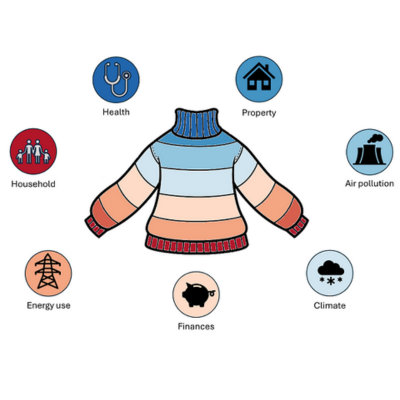Electric heat pumps could be the UK’s only hope of reaching our 2050 Net Zero targets.
Heating buildings is responsible for as much as 37% of the country's total carbon emissions, with 14% of this being household heating alone.
The Government’s Committee on Climate Change has called for an urgent decarbonisation of all heat in buildings, and this requires a major shift away from fossil fuel-based heating systems. With 87% of households on the national gas grid, replacing gas boilers with heat pumps would make a huge contribution towards achieving this goal.
Since 2021, UrbanTide has been involved in a large-scale £14.6m government-funded program that’s exploring how to do just that. The Electrification of Heat demonstration involves trialling heat pump deployment while gathering crucial data that will help optimize and accelerate the roll-out process across the country.
But what exactly are electric heat pumps and how can data help authorities get the job done quicker?

What are electric heat pumps?
Electric heat pumps are a heating system that extracts heat from the air or ground and transfers it into a building to provide heating and hot water. They work by using a refrigerant to absorb heat from outside a building, then compress and circulate it through a closed-loop system to release the heat indoors.
Heat pumps are highly energy-efficient, as they only need a small amount of electricity to operate the compressor and circulating pump. This makes electric heat pumps an excellent low-carbon alternative to traditional fossil fuel-based heating systems.
Hydrogen and heat networks could also be used to decarbonise the national gas grid, but electric heat pumps have been identified as the best option for
- Renewable energy sources: Heat pumps can be powered by renewable energy sources such as wind or solar power, whereas the production of hydrogen may require non-renewable sources of energy.
- Efficiency: Heat pumps are generally more efficient than hydrogen or heat networks, meaning they require less energy input to produce the same amount of heat.
- Simplicity: Electric heat pumps are relatively simple to install and use, while hydrogen or heat networks may require more complex infrastructure.
- Cost: Heat pumps can be cheaper to install and maintain than hydrogen or heat networks, depending on the specific circumstances.
- Flexibility: Heat pumps can be used in both residential and commercial settings, and can be installed in individual homes, while hydrogen or heat networks may be more suited for larger-scale applications
The Electrification of Heat Demonstration Project
The Electrification of Heat (EoH) challenge is a first-of-its-kind trial that’s exploring the feasibility of rolling out electric heat pumps across the UK’s entire 29 million housing stock.
The £14.6m project is funded by the UK government through the Department for Energy Security and Net Zero (DESNZ - previously BEIS) and managed by Energy Systems Catapult.
The main aims of the project are:
- To develop, test and evaluate products and services that will increase the appeal of heat pumps and encourage technological innovation
- To better understand the challenges involved in a large-scale heat pump rollout and devise ways to overcome them
- To increase public confidence in heat pumps and demonstrate that they can deliver high consumer satisfaction
- To prove the practical and technical feasibility of heat pumps for UK homes and identify costs
- To capture real-time data that we can learn from and devise ways to support wider deployment of heat pumps in Britain - and accelerate the process.
- To support and enable public debate and strategic decisions around the deployment of heat pumps.
UrbanTide’s role in the project
UrbanTide are playing a crucial role in the EoH project by providing the data hosting and sharing technology for the entire ongoing trial.
To kickstart the trail, three delivery contractors were appointed to install 750 heat pumps in different locations across the UK:
- E.ON with trials in Newcastle
- OVO Energy in the South East of England
- Warmworks in the South East of Scotland.
Each home was fitted with 20 Internet of Things (IoT) sensors to monitor important data points like real-time energy usage, room temperatures and humidity levels.
All data from these sensors is aggregated through UrbanTide’s uSmart data insights platform to provide a single source of truth. The data is collected in 15-minute intervals and automatically validated to conform to specified data standards.
The datasets continue to grow and billions of data rows are continuously being shared with researchers and businesses seeking to develop new innovative technology and business opportunities related to heat pumps.
By testing and closely monitoring the deployment of heat pumps in selected areas, this provides information that can be used to accelerate the replacement of gas boilers across the UK’s entire 29 million housing stock.
For two years now, we have been gathering data from hundreds of homes across the UK to test how effective heat pumps are and find ways of using data to accelerate the decarbonization of the gas grid.
EoH project: The results so far
Recently, the EoH project was able to prove that all housing types are suitable for - and can benefit from - the installation of electric heat pumps.
Energy and Clean Growth Minister, Lord Callanan, said:
“Heat pumps powered by clean, renewable energy will be key to warming UK homes in a net zero future.
This trial demonstrates that low-carbon heating systems are an effective alternative for homes of all types and ages.
As technology continues to improve and costs plummet over the next decade, [heat pumps] will become the obvious, affordable choice for consumers.”
EoH is an ambitious project that requires vast amounts of data collection to gain a true picture of how to optimze the heat pump deployment process.
UrbanTide is proud to be leading all data aspects of this project, providing a single source of truth that allows for research and innovation to happen within the project. Through data, we can accelerate the deployment of heat pumps across the UK, reduce our CO2 emissions and fast-track towards Net Zero.






